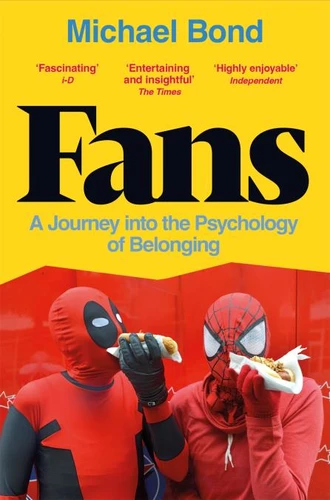Fans. A Journey into the Psychology of Belonging
Par :Formats :
Disponible dans votre compte client Decitre ou Furet du Nord dès validation de votre commande. Le format ePub protégé est :
- Compatible avec une lecture sur My Vivlio (smartphone, tablette, ordinateur)
- Compatible avec une lecture sur liseuses Vivlio
- Pour les liseuses autres que Vivlio, vous devez utiliser le logiciel Adobe Digital Edition. Non compatible avec la lecture sur les liseuses Kindle, Remarkable et Sony
- Non compatible avec un achat hors France métropolitaine
 , qui est-ce ?
, qui est-ce ?Notre partenaire de plateforme de lecture numérique où vous retrouverez l'ensemble de vos ebooks gratuitement
Pour en savoir plus sur nos ebooks, consultez notre aide en ligne ici
- Nombre de pages320
- FormatePub
- ISBN978-1-5290-5250-3
- EAN9781529052503
- Date de parution11/05/2023
- Protection num.Adobe DRM
- Infos supplémentairesepub
- ÉditeurPicador
Résumé
'A celebration of human idiosyncrasy and of our talent for building shared meaning and solidarity out of the strangest material' - TLSFans takes you on a journey into the world of superfans - in all of its strange, sometimes dark, and complicated forms. Fascinating and thought-provoking, Fans is a story of communities, of what happens to us when we interact with people who share our passions. The human brain is wired to reach out, and while our groupish tendencies can bring much strife (religious intolerance, racism, war, etc.), they are also the source of some of our greatest satisfactions.
Fandoms offer much of the pleasure of tribalism with little of the harm: a feeling of belonging and of shared culture, a sense of meaning and purpose, improved mental well-being, reassurance that our most outlandish convictions will be taken seriously, and the freedom to try to emulate (and dress like) our hero. But acclaimed science writer Michael Bond shows that despite these benefits, the world of fandoms is not without its dark underside, from the "copycat effect" fuelling mass shootings to the delusions that can accompany the parasocial relationships that fans feel they have with their heroes.
In Fans, Michael Bond draws on the work of social psychologists and anthropologists to understand how people behave in groups and why such groups have such a profound effect on human culture.
Fandoms offer much of the pleasure of tribalism with little of the harm: a feeling of belonging and of shared culture, a sense of meaning and purpose, improved mental well-being, reassurance that our most outlandish convictions will be taken seriously, and the freedom to try to emulate (and dress like) our hero. But acclaimed science writer Michael Bond shows that despite these benefits, the world of fandoms is not without its dark underside, from the "copycat effect" fuelling mass shootings to the delusions that can accompany the parasocial relationships that fans feel they have with their heroes.
In Fans, Michael Bond draws on the work of social psychologists and anthropologists to understand how people behave in groups and why such groups have such a profound effect on human culture.
'A celebration of human idiosyncrasy and of our talent for building shared meaning and solidarity out of the strangest material' - TLSFans takes you on a journey into the world of superfans - in all of its strange, sometimes dark, and complicated forms. Fascinating and thought-provoking, Fans is a story of communities, of what happens to us when we interact with people who share our passions. The human brain is wired to reach out, and while our groupish tendencies can bring much strife (religious intolerance, racism, war, etc.), they are also the source of some of our greatest satisfactions.
Fandoms offer much of the pleasure of tribalism with little of the harm: a feeling of belonging and of shared culture, a sense of meaning and purpose, improved mental well-being, reassurance that our most outlandish convictions will be taken seriously, and the freedom to try to emulate (and dress like) our hero. But acclaimed science writer Michael Bond shows that despite these benefits, the world of fandoms is not without its dark underside, from the "copycat effect" fuelling mass shootings to the delusions that can accompany the parasocial relationships that fans feel they have with their heroes.
In Fans, Michael Bond draws on the work of social psychologists and anthropologists to understand how people behave in groups and why such groups have such a profound effect on human culture.
Fandoms offer much of the pleasure of tribalism with little of the harm: a feeling of belonging and of shared culture, a sense of meaning and purpose, improved mental well-being, reassurance that our most outlandish convictions will be taken seriously, and the freedom to try to emulate (and dress like) our hero. But acclaimed science writer Michael Bond shows that despite these benefits, the world of fandoms is not without its dark underside, from the "copycat effect" fuelling mass shootings to the delusions that can accompany the parasocial relationships that fans feel they have with their heroes.
In Fans, Michael Bond draws on the work of social psychologists and anthropologists to understand how people behave in groups and why such groups have such a profound effect on human culture.























